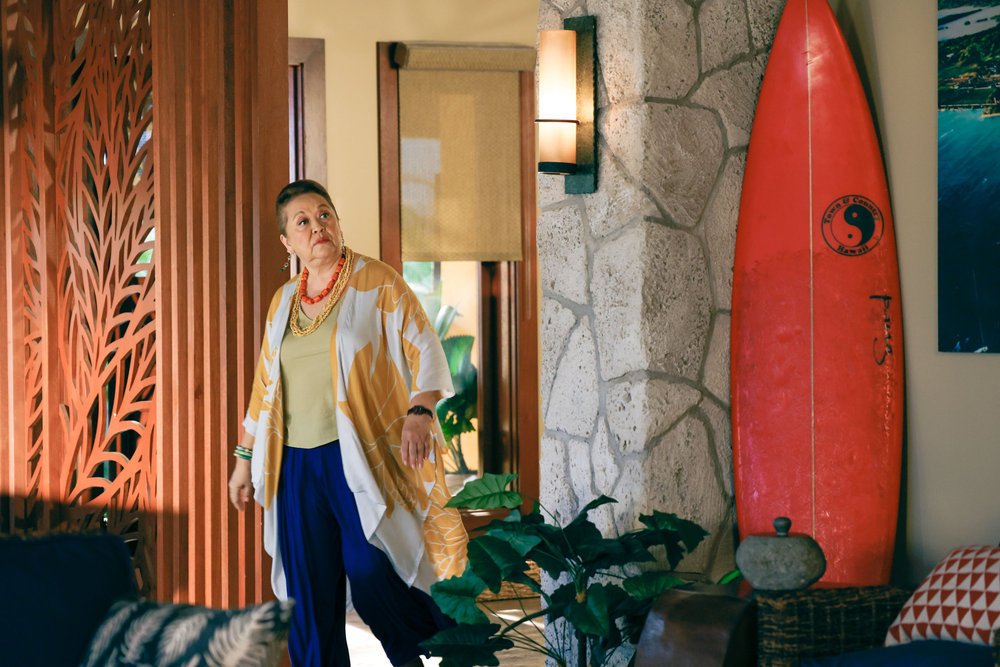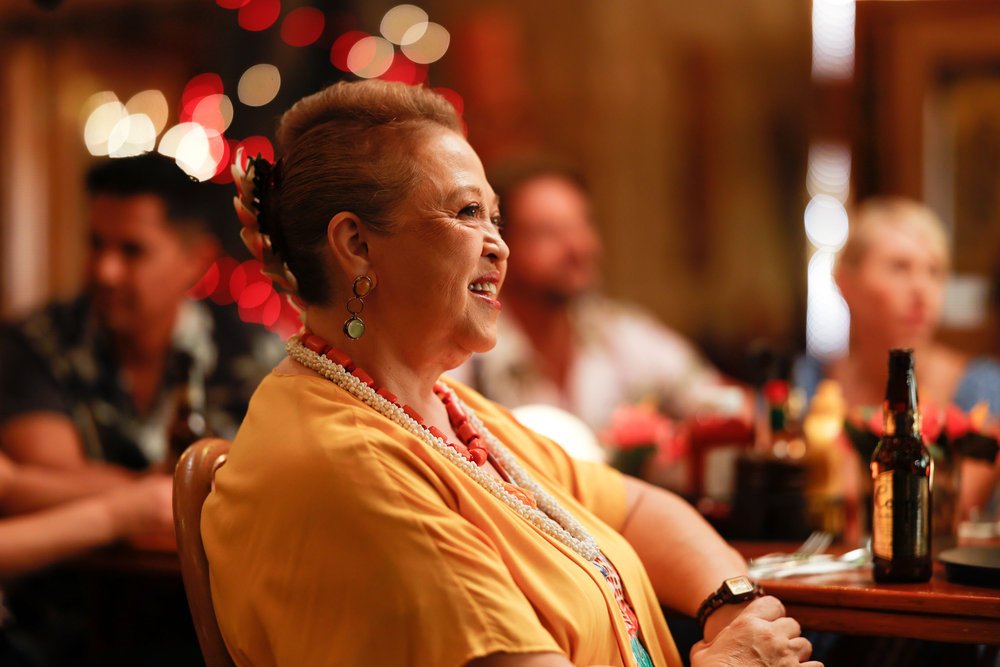Photo Credit: Brian Bowen Smith, NBC
After getting her start doing improv and performing with the Asian American Theater Company in the Bay Area, Amy Hill went on to become an undeniable force of on-screen character acting with over 200 television and film credits to her name. You might recognize her from episodes of That’s So Raven, Crazy Ex-Girlfriend, or American Dad. Her films include Lilo & Stitch, 50 First Dates, and Spider-Man: Homecoming. Now, she stars as Kumu in the fifth season of Magnum P.I. streaming now on Peacock. We were lucky enough to catch Hill on Zoom from her home in Hawai’i to talk about her incredibly successful career and the process of becoming Kumu.
Interview
Hi, Amy, I'm so very excited to talk to you, because you’re a mixed-Asian TV legend.
Oh, thank you!
Your very prolific career in television has seen you age up many times to play roles like Margaret Cho's grandmother or Betty White's best friend in the 1990s. Did those years of taking on very comedic older roles prepare you for now owning your space in this more grounded, knowledgeable character of Kumu at this point in your career?
Well, it's kinda nice that I've been able to age into my actual age. I feel like at this age — playing this age — I feel more youthful. So I think I missed the opportunity to play younger. I mean, I was older, but I would play old. You know, when you're young, you overact old.
I'm gonna be 70 in May, so I love when people say, “Oh, you don't look 70. You don't seem 70.” I don't feel 70 either! I feel — well, sometimes when I wake up in the morning, 70, but mostly, you know… I feel younger!
I feel like 70 is the new 50.
Photo Credit: Brian Bowen Smith, NBC
Period. Do you identify as a “character actor”?
Oh, totally. That's my jam. I started in theatre and I loved taking on different kinds of characters. In San Francisco, I started in theatre at the Asian American Theater Company, and then I also did improvisational theatre. I love watching people and trying to figure out those people — the way they walk, the way they talk, the way they move, act, think — those are things that fascinate me. So I really enjoyed the exploration of characters.
I think I played one onstage kind of glamour girl. But then I had to kiss somebody and it was not fun. I don't wanna kiss anybody on stage. I think the Japanese part of me is like, I don't wanna kiss people in front of people! So I enjoy character work.
With your background in improv and theatre, when you're approaching a role on TV, do you try to find similarities between yourself and that character and then bring yourself to it? Or do you approach roles from the perspective of total transformation?
I think it depends on the character. If it's a character that's, you know, from China, I have to use my imagination more, and then I will pick somebody specific that I will sort of make my muse. So, you know, use their accent, their history and background and their circumstances and try to layer that onto me.
I'm always the center of any character because that's who I have to work with. So in my grandma in All-American Girl, the center was me. But also I'd been doing my mother in theatre and improv for 20 years before I did that character! And I'd lived with my mother for 40 years so I knew my mom inside and out and I knew I could make her real. So I think the closer the character is to me, sometimes, the better because I can inhabit her more easily. I enjoy doing accents, but I wanna make sure that the accent is appropriate and right — authentic.
I think if you're really specific about stuff, people see beyond the stuff, and then they see the center of who you are and that's what they connect with. Even Kumu, when I was starting this character, I was shadowing a lot of people that would've been this character in life. I used a lot of that. And I feel that's what locals all think I'm representing. And they're so wonderful. They come up to me all the time and say, “Thank you for representing. I'm so proud of who you are on the show.” It makes me really happy that they feel like I'm representing them in a positive light and that I'm being as authentic as I can. And I work really hard because I don't want anybody to feel as though I'm embarrassing a culture.
Amy Hill as Kumu on Magnum P.I.
Photo Credit: Zack Dougan
Now that we're on the fifth season of Magnum P.I., do you feel like you and Kumu have grown more similar through the run of the show? Do you find yourself being more Kumu in life, or Kumu being a little bit more Amy?
I feel like I do. I am more Kumu in life because when I'm out and about, if I separate myself too much, I don't wanna shock the population if they run into me at Whole Foods or something.
And you were born in South Dakota. I know you grew up in Seattle, you went to school in Japan, and now you've been living in Hawaii for the filming of this show. What's it like now living in a place where the majority of folks you're surrounded by are mixed AAPI people?
It is a dream come true. I never would've imagined that I would live here. I mean, I would think about it, but it just didn't seem to make any sense — to move away from the mainland and position myself here. The show gave me an opportunity to really see what life was like living here. It also gave me the opportunity to afford a nice condo.
I’ve made incredibly good friends over the four and a half years that I've lived here. And I had friends from before, so I have friends that I've known for 40 years, 30 years, and five years. I've got a wonderful community here. And I love that nobody asks me what I am.
Amy Hill as Kumu on Magnum P.I.
Photo Credit: Zack Dougan
So, this is a huge question: What is the secret to longevity as an actor in this business?
I think flexibility. And also, I rarely say no to anything unless it's incredibly offensive and really shallow and superficial.
I've been given more opportunities than I ever would've imagined, you know? For a while they would write stuff for a man, and I remember one part I had was The Naked Truth with Taylor Leon and the breakdown said that they were looking for a Danny DeVito type, and I got called in. So, you know, I've gone up against really macho men for parts and gotten them. I don't know how people perceive me, but definitely, obviously, I'm a character actor. And I did something where the character description was “super evil like Pol Pot” or “possibly without eyes” and they called me in. They thought I would be perfect for it. So… it’s exciting! Even I would not have thought, “Yeah I think I should submit for that.” But they think I will, so I’ve always said, “Yes! Let’s see where this goes.” And then I get it, and then I’m challenged by it.
Did you have influences growing up that were either Asian actors or just character actors who you were like, “Oh wow, that person's versatility is so cool?”
Well, I've always sort of enjoyed comedy, and I remember because my family was mixed (my father was Finnish from South Dakota and my mom was Japanese from Japan) I loved the Lucille Ball show ’cause that seemed like my family. My mom was Desi, obviously. And then my dad was Lucy, I guess. But it was sort of that mix of craziness in the household that we also had in our household. I loved that.
I loved Carol Burnett. I loved all of the comedy stuff. I was never funny as a child because I was the only Asian, mixed-Asian especially, in my elementary school. In my head I was funny, but I couldn't say it out loud.
Amy Hill as Kumu on Magnum P.I.
Photo Credit: Zack Dougan
Oh sure, lots of years of practice!
Yeah!
That's all the time we have, but thank you so much! I have to say, I'm a big Crazy Ex-Girlfriend fan, so this was really cool for me personally.
Yayyyy, thank you so much!
“Get Your Ass Out of My House”? Forever streaming.
Well, that was real, ’cause my daughter, I wanted her ass out of the house.
HAHA.
End of Interview
*This interview has been edited for length and clarity.
Born and raised on the east side of O’ahu, Erica learned about improv comedy in 7th grade, and has been a public menace ever since. She holds a BFA in Musical Theatre from the University of Michigan and can be found yelling about coming of age love stories, pop culture, and mythology with her genius co-host/best friend on their podcast Seaweed Brain.
Check it out @SeaweedBrainPodcast. www.ericaito.com
JoySauce is a multimedia network dedicated to celebrating the full spectrum of Asian American and Pacific Islander narratives. The site boasts a vibrant library of content around entertainment, lifestyle, food, travel, culture, relationships, art, and education in the form of exciting new streaming shows, movies, standup comedy, provocative podcasts, and a suite of editorial updated daily.







